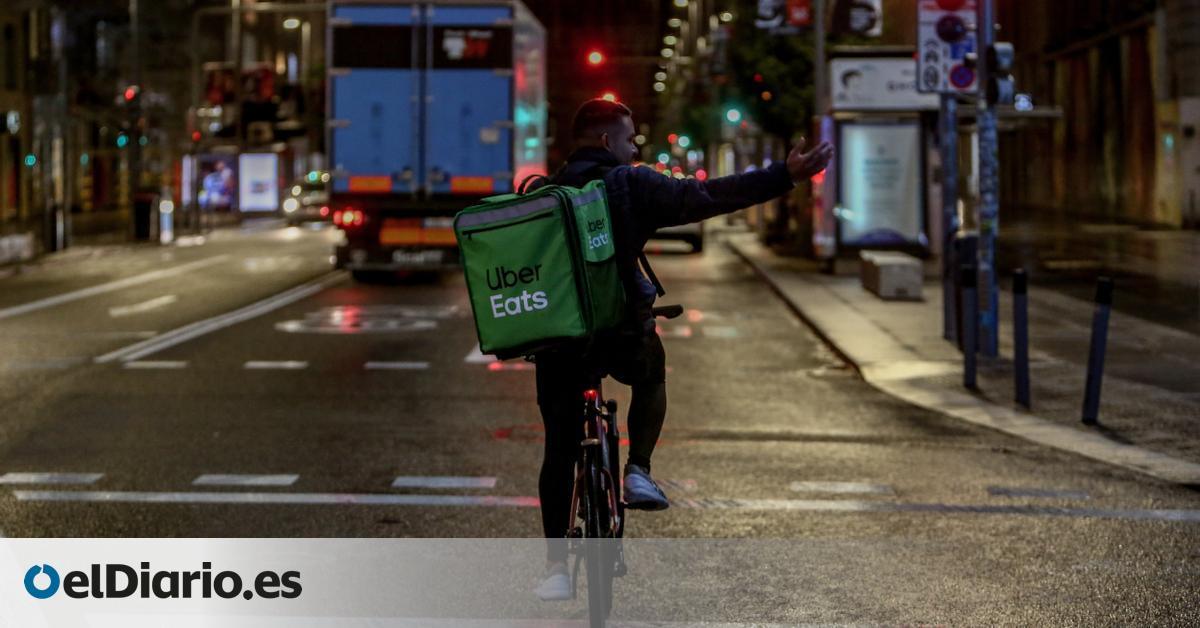
The Constitutional Court has given its definitive endorsement to the rule put in place to combat the abuse of the figure of the false self-employed on home delivery platforms. The plenary session has rejected the Popular Party’s appeal against the ‘rider law’, endorsing its processing as a royal decree-law: the COVID crisis, it states, “generated the need to define public policies for an immediate response to new problems, including of the radically precarious conditions in which the delivery drivers of digital platform companies provided their services.”
The rule, appealed to the Constitutional Court without success by both the PP and Vox, was approved in mid-2021 with the objective, as stated by the central executive, of combating the systematic abuse of the employment figure of the false self-employed by companies of Home delivery with platforms such as Glovo, Deliveroo or Uber Eats. By then, several courts across the country had already written in their rulings that the riders, as those companies claimed, were being used fraudulently as false self-employed workers.
The PP appeal attacked the same aspects as the Vox appeal: the processing of this norm through the emergency procedure, as a royal decree-law. A “political marketing operation usurping Parliament’s constitutionally proper function,” Santiago Abascal’s party denounced in its appeal. Alberto Núñez Feijóo’s party also denied the “urgent need” for the process.
The court, with the abstention of Juan Carlos Campo and the vote against four conservative magistrates, endorses that the decree-law route was used: “The Government offered an explicit and reasoned justification of the urgent need to respond to the problem of the distributors”, explains the sentence. The pandemic, he adds, “posed an unprecedented and unpredictable emergency situation, which gave rise to the declaration of two successive national states of alarm and which caused a rupture of social, economic and political normality that also affected the production system.” legislative”.
One of those needs, he says, was to control the “radical precariousness” of the riders. He also highlights the social dialogue “between government, unions and business associations.” A few weeks ago the deliberations of the Constitutional Court pointed to the rejection of the appeals. The speaker in charge of resolving Vox’s appeal was betting on at least partially agreeing with the ultra party and, due to its lack of support, withdrew his draft ruling pending deliberations on the Popular Party’s appeal.
Thousands of false self-employed
The regulations now endorsed by the Constitutional Court came into force in 2021 and began to consider that the delivery people of this type of platforms are employed workers and not self-employed. It also introduced an obligation of transparency for all companies that used some type of algorithm to calculate the performance of workers or the tasks that should be done to them.
By the time the rule was approved, the Labor Inspection had already detected almost 18,000 false self-employed workers in these companies. Files that were close to 26 million euros while dozens of rulings, including the Supreme Court, sanctioned by social jurisdiction that delivery companies abused the figure of the false self-employed to reduce the economic burden that having hundreds of people at their service meant. these ‘riders’.
Four judges against
The sentence has gone ahead with the vote against four judges from the conservative sector of the court: Enrique Arnaldo, Ricardo Enríquez, César Tolosa and Concepción Espejel. They understand that the circumstances alleged by the executive to process the law as a royal decree-law, of urgency, did not exist: “Digital delivery platforms are not a “new” reality, as the decree-law says, but rather they were known. by the administration and the government at least since 2015,” the four dissident magistrates reproach.
The Supreme Court, remember, established its doctrine on this matter already in 2020 but did not generate a “regulatory vacuum” but rather “consolidated the jurisprudence of the social order courts that since 2018 had been considering false self-employed workers who operate under “workers.” control of digital platforms.” Finally, they criticize that if there was a legislative urgency, the Government opened a negotiation table with social agents.
“The protection of workers and people in situations of economic vulnerability that the decree-law pursues is a laudable objective and a constitutional imperative,” these magistrates recall, but it must be channeled “through the channels provided for in the Constitution, not apart from them,” they explain.
Source: www.eldiario.es

